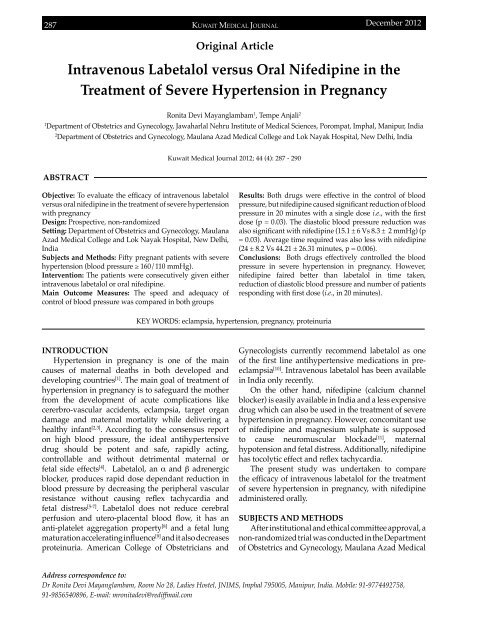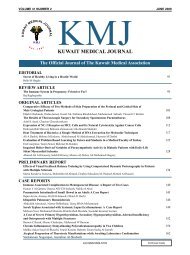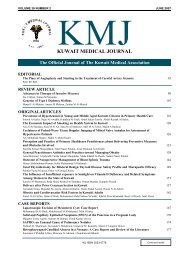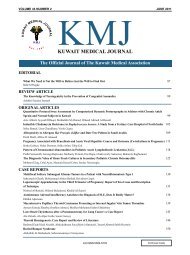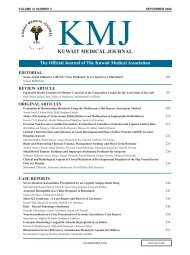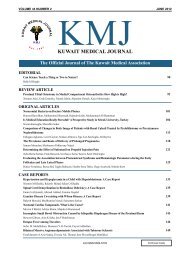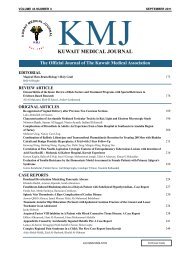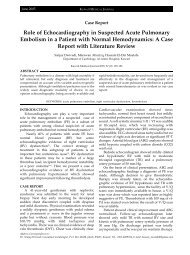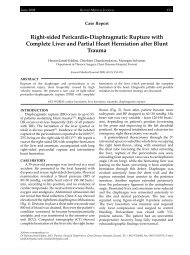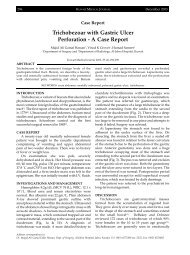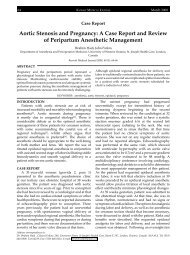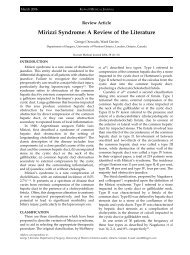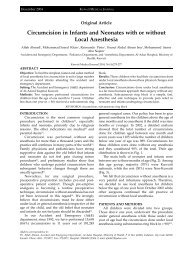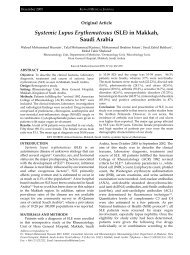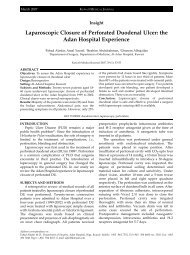Vol 44 # 4 December 2012 - Kma.org.kw
Vol 44 # 4 December 2012 - Kma.org.kw
Vol 44 # 4 December 2012 - Kma.org.kw
You also want an ePaper? Increase the reach of your titles
YUMPU automatically turns print PDFs into web optimized ePapers that Google loves.
287<br />
KUWAIT MEDICAL JOURNAL<br />
<strong>December</strong> <strong>2012</strong><br />
Original Article<br />
Intravenous Labetalol versus Oral Nifedipine in the<br />
Treatment of Severe Hypertension in Pregnancy<br />
Ronita Devi Mayanglambam 1 , Tempe Anjali 2<br />
1<br />
Department of Obstetrics and Gynecology, Jawaharlal Nehru Institute of Medical Sciences, Porompat, Imphal, Manipur, India<br />
2<br />
Department of Obstetrics and Gynecology, Maulana Azad Medical College and Lok Nayak Hospital, New Delhi, India<br />
Kuwait Medical Journal <strong>2012</strong>; <strong>44</strong> (4): 287 - 290<br />
ABSTRACT<br />
Objective: To evaluate the efficacy of intravenous labetalol<br />
versus oral nifedipine in the treatment of severe hypertension<br />
with pregnancy<br />
Design: Prospective, non-randomized<br />
Setting: Department of Obstetrics and Gynecology, Maulana<br />
Azad Medical College and Lok Nayak Hospital, New Delhi,<br />
India<br />
Subjects and Methods: Fifty pregnant patients with severe<br />
hypertension (blood pressure ≥ 160/110 mmHg).<br />
Intervention: The patients were consecutively given either<br />
intravenous labetalol or oral nifedipine.<br />
Main Outcome Measures: The speed and adequacy of<br />
control of blood pressure was compared in both groups<br />
Results: Both drugs were effective in the control of blood<br />
pressure, but nifedipine caused significant reduction of blood<br />
pressure in 20 minutes with a single dose i.e., with the first<br />
dose (p = 0.03). The diastolic blood pressure reduction was<br />
also significant with nifedipine (15.1 ± 6 Vs 8.3 ± 2 mmHg) (p<br />
= 0.03). Average time required was also less with nifedipine<br />
(24 ± 8.2 Vs <strong>44</strong>.21 ± 26.31 minutes, p = 0.006).<br />
Conclusions: Both drugs effectively controlled the blood<br />
pressure in severe hypertension in pregnancy. However,<br />
nifedipine faired better than labetalol in time taken,<br />
reduction of diastolic blood pressure and number of patients<br />
responding with first dose (i.e., in 20 minutes).<br />
KEY WORDS: eclampsia, hypertension, pregnancy, proteinuria<br />
INTRODUCTION<br />
Hypertension in pregnancy is one of the main<br />
causes of maternal deaths in both developed and<br />
developing countries [1] . The main goal of treatment of<br />
hypertension in pregnancy is to safeguard the mother<br />
from the development of acute complications like<br />
cererbro-vascular accidents, eclampsia, target <strong>org</strong>an<br />
damage and maternal mortality while delivering a<br />
healthy infant [2,3] . According to the consensus report<br />
on high blood pressure, the ideal antihypertensive<br />
drug should be potent and safe, rapidly acting,<br />
controllable and without detrimental maternal or<br />
fetal side effects [4] . Labetalol, an α and β adrenergic<br />
blocker, produces rapid dose dependant reduction in<br />
blood pressure by decreasing the peripheral vascular<br />
resistance without causing reflex tachycardia and<br />
fetal distress [5-7] . Labetalol does not reduce cerebral<br />
perfusion and utero-placental blood flow, it has an<br />
anti-platelet aggregation property [8] and a fetal lung<br />
maturation accelerating influence [9] and it also decreases<br />
proteinuria. American College of Obstetricians and<br />
Gynecologists currently recommend labetalol as one<br />
of the first line antihypertensive medications in preeclampsia<br />
[10] . Intravenous labetalol has been available<br />
in India only recently.<br />
On the other hand, nifedipine (calcium channel<br />
blocker) is easily available in India and a less expensive<br />
drug which can also be used in the treatment of severe<br />
hypertension in pregnancy. However, concomitant use<br />
of nifedipine and magnesium sulphate is supposed<br />
to cause neuromuscular blockade [11] , maternal<br />
hypotension and fetal distress. Additionally, nifedipine<br />
has tocolytic effect and reflex tachycardia.<br />
The present study was undertaken to compare<br />
the efficacy of intravenous labetalol for the treatment<br />
of severe hypertension in pregnancy, with nifedipine<br />
administered orally.<br />
SUBJECTS AND METHODS<br />
After institutional and ethical committee approval, a<br />
non-randomized trial was conducted in the Department<br />
of Obstetrics and Gynecology, Maulana Azad Medical<br />
Address correspondence to:<br />
Dr Ronita Devi Mayanglambam, Room No 28, Ladies Hostel, JNIMS, Imphal 795005, Manipur, India. Mobile: 91-977<strong>44</strong>92758,<br />
91-9856540896, E-mail: mronitadevi@rediffmail.com


